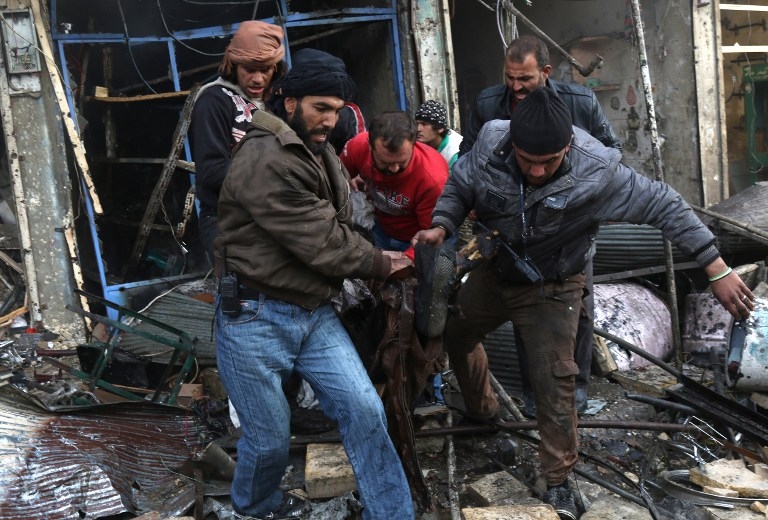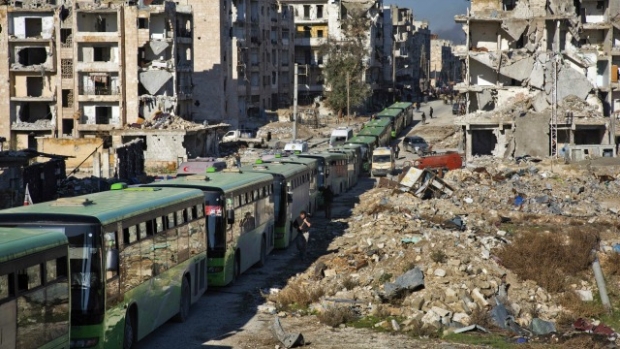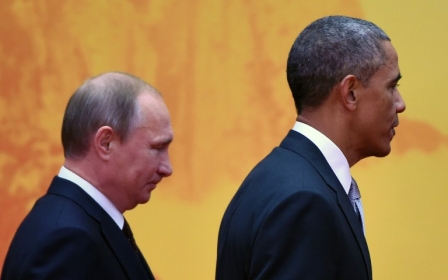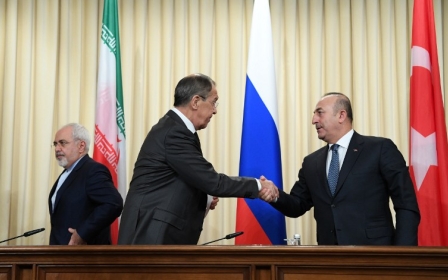Syria warns of 'open war' in Idlib as coalition strikes Fateh al-Sham

Syria is prepared for "open war" against rebels in Idlib - where the government has been allowing them to gather under ceasefire deals - the government official in charge of negotiations said on Friday.
The comments came as the US-led coalition appeared to step up its bombing campaign in Idlib against Jabhat Fateh al-Sham, the group that was formerly an al-Qaeda affiliate.
A senior member of Fateh al-Sham Front was killed by a drone in northern Syria Friday, a monitor said.
"A leading member of the Fateh al-Sham Front, Abu Al-Hassan Taftanaz, died in a drone attack" in the northwestern province of Idlib, the Syrian Observatory for Human Rights said.
An Islamic legal scholar belonging to the group, Taftanaz's son, also died in the raid, it said.
Idlib, which is in the north of Syria and borders Aleppo province, has become home to thousands of fighters evacuted from key areas under what Damascus calls "reconciliation" deals.
READ: Last chance saloon for Syria's rebels
Rebels agree to give up territory in return for safe passage out of areas, including suburbs of the capital.
Idlib is now the biggest remaining rebel stronghold in the country.
Idlib was also the destination for many of the 35,000 rebel fighters and civilians evacuated from eastern Aleppo last month in a deal brokered by Turkey and Russia, Assad's most powerful ally, after opposition groups in the city were defeated.
Ali Haidar, who as national reconciliation minister has been responsible for negotiating local deals, said he expected more accords in coming months to send thousands of fighters to Idlib from areas near Damascus and south of it, as the army advances.
But in an interview in Damascus on Friday, he said the state could not allow Idlib to remain in rebel hands indefinitely. Unless there was an international deal that addressed the situation, "then the other option is to go to an open war with them", he said.
"The Syrian state was clear in its policy when it said it will not forego any patch of Syria, and I think Idlib is one of the coming hot areas," Haidar told Reuters.
READ: Welcome to Idlib, 'the next Aleppo'
He said foreign fighters must leave and rebel supply lines via Turkey must be cut off.
Allowing fighters who surrender elsewhere to escape to Idlib has emerged as the basic offer on the table wherever government forces have rebel-held areas under siege.
Damascus says its deals permit Syrians to stay as life returns to normal after a ceasefire. The opposition says the deals amount to forced demographic change to drive out Assad's opponents, an aim that the government denies.
Idlib province, which also borders with Turkey, is almost entirely controlled by rebel groups fighting to topple Assad, including powerful Islamist factions such as Ahrar al-Sham and Jabhat Fateh al-Sham, formally known as al-Nusra Front.
The Syrian government reportedly dropped leaflets on Idlib on Friday reading: "There is no place for the terrorists of al-Nusra Front in Syria".
Strikes target Jabhat Fateh al-Sham
Haider's comments came as the US-led coalition appeared to intensify its attacks against Jabhat Fateh al-Sham in Idlib province, killing a commander.
A local leader known as Abu al-Hassan was killed in a coalition strike on the car he was travelling in, Sky News Arabia reported.
Syrian journalist Mousa al-Omar reported that the man's son and uncle were also killed in the strike, which occurred in their hometown of Taftanaz some 20 kilometres from the provincial capital.
Abu al-Hassan, whose real name was reportedly Younes Shaib, was a religious and military adviser for the group.
Earlier this week the group accused the US-led coalition of striking its local headquarters in Idlib, killing 25 people.
Middle East Eye propose une couverture et une analyse indépendantes et incomparables du Moyen-Orient, de l’Afrique du Nord et d’autres régions du monde. Pour en savoir plus sur la reprise de ce contenu et les frais qui s’appliquent, veuillez remplir ce formulaire [en anglais]. Pour en savoir plus sur MEE, cliquez ici [en anglais].





